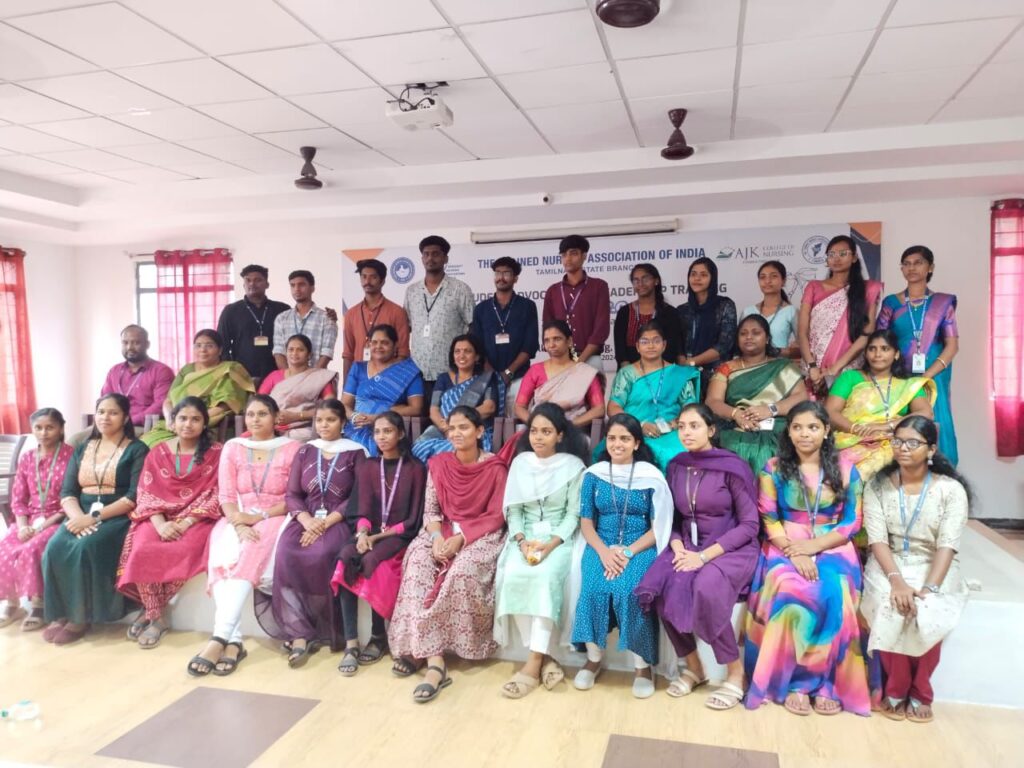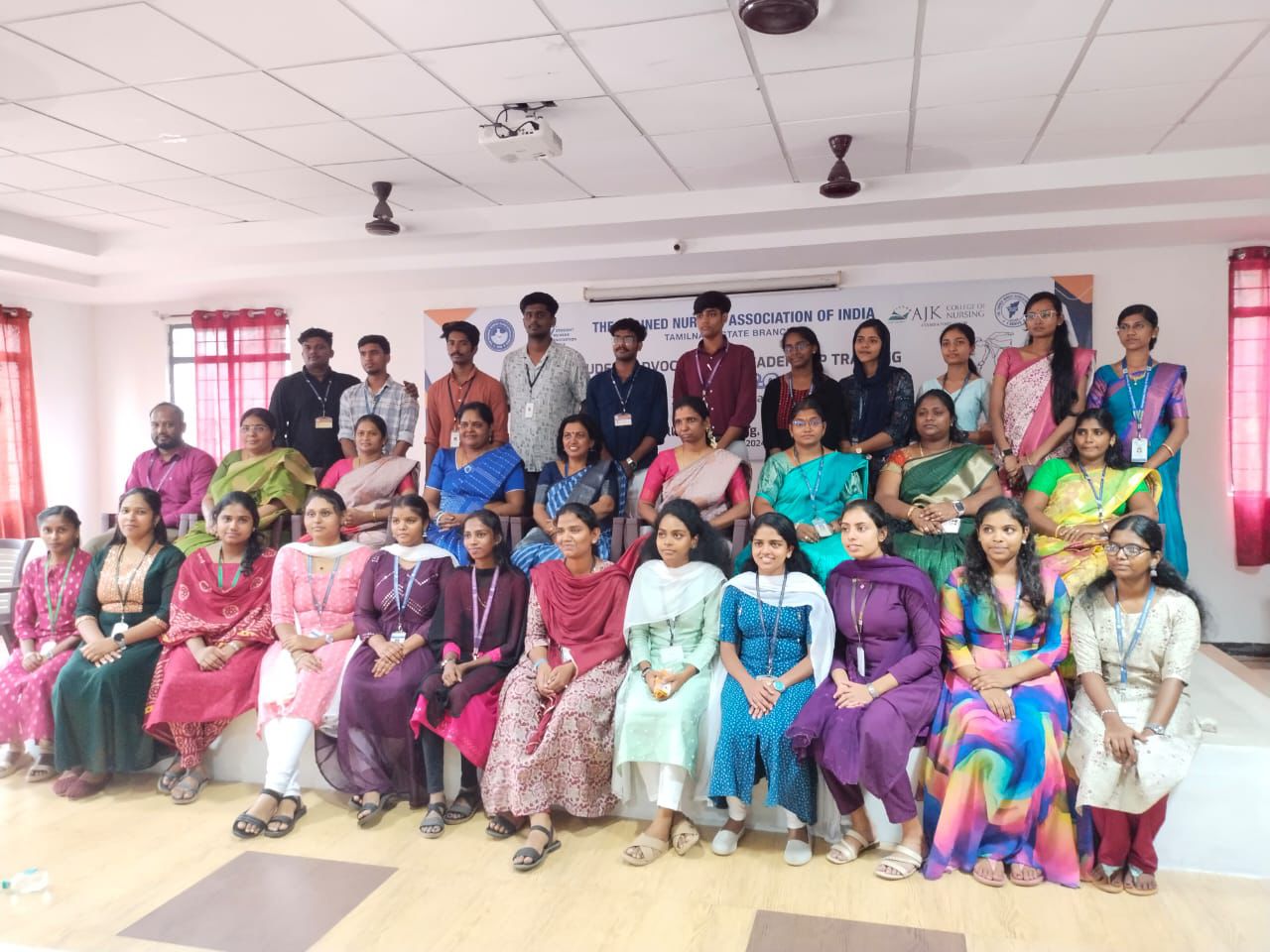
STUDENT ADVOCACY AND LEADERSHIP TRAINING (SALT-2.0): EMPOWERING FUTURE NURSING LEADERS
The Trained Nurses Association of India (TNAI) Tamil Nadu State Branch proudly organized the Student Advocacy and Leadership Training (SALT-2.0) Programme, a transformative event aimed at cultivating leadership and advocacy skills among emerging nursing professionals. Hosted by AJK College of Nursing, this prestigious program attracted aspiring nursing leaders from across the state, fostering an environment of growth, collaboration, and professional excellence.
Representing our institution was Clinical Instructor Mr. Shamsudeen, alongside Mr. Alwin Baby, SNA Vice President, and Mr. Anand, SNA Secretary. Their active participation underscored the commitment of our students and faculty to professional development and engagement in initiatives that drive positive change within the nursing community.
Objectives of the SALT-2.0 Programme
The SALT-2.0 Programme is meticulously designed to nurture leadership qualities and advocacy skills among nursing students. By focusing on critical areas such as professional networking, effective communication strategies, ethical decision-making, and influencing healthcare policies, the program equips participants to assume leadership roles in their academic and professional journeys. The ultimate goal is to empower nurses to contribute significantly to the advancement of the healthcare sector, ensuring high standards of patient care and ethical practices.
Activities and Sessions
The SALT-2.0 Programme featured a comprehensive array of interactive workshops, keynote speeches, and breakout sessions, each tailored to address various facets of advocacy and leadership in nursing. Expert speakers from diverse backgrounds shared their insights, providing participants with practical tools to navigate complex healthcare environments and address patient care challenges effectively.
Key Highlights of the Programme Included:
- Leadership Skills Workshops: These sessions focused on developing self-awareness, emotional intelligence, and collaborative teamwork. Participants engaged in activities that highlighted the importance of these attributes in effective leadership roles, preparing them to lead with empathy and strategic thinking.
- Advocacy Training: This segment emphasized the critical role of nurses in advocating for patient rights, ethical practices, and robust nursing policies. Through role-playing exercises, participants gained hands-on experience in advocating for necessary changes and improvements within the healthcare system.
- Panel Discussions: Featuring senior nurses and industry leaders, these discussions delved into current challenges facing the healthcare sector. Participants received valuable guidance on implementing leadership strategies to overcome these obstacles, fostering resilience and adaptability in their professional roles.
- Networking Opportunities: The program provided ample opportunities for students, faculty, and nursing professionals to connect and exchange ideas. These interactions facilitated the sharing of experiences and best practices, fostering a supportive network that participants can leverage throughout their careers.
Contribution of Our Delegates
Our representatives, Mr. Alwin Baby and Mr. Anand, actively engaged in all aspects of the program, demonstrating their enthusiasm and potential as future leaders in nursing. Their participation in workshops and discussions showcased their dedication to enhancing their skills and their ability to represent the college with distinction. Facilitators commended their insightful contributions during group activities, recognizing them as promising leaders within the nursing community.
Mr. Shamsudeen, serving as a clinical instructor, played a pivotal role in mentoring the students. His guidance ensured that our delegates remained actively involved and fully benefited from the program. Mr. Shamsudeen’s support amplified the positive impact of the SALT-2.0 experience on their professional development, reinforcing the importance of mentorship in shaping competent and visionary nursing leaders.
Impact and Takeaways
The SALT-2.0 Programme proved to be an invaluable platform for our participants, equipping them with essential skills to excel as nursing advocates and leaders. The comprehensive training provided insights that will enable them to contribute meaningfully to the healthcare sector, inspiring their peers and driving forward initiatives that enhance patient care and professional standards.
Participants left the program with a strengthened sense of purpose and a clear understanding of the vital role they play in the nursing profession. The knowledge and skills acquired during the event will undoubtedly support their growth as leaders who can navigate and influence the evolving landscape of healthcare.
Conclusion
The involvement of our students and faculty in the SALT-2.0 Programme not only facilitated their individual growth but also elevated the reputation of AJK College of Nursing within the nursing fraternity. This participation underscores our institution’s unwavering commitment to nurturing competent and visionary professionals who are prepared to lead the future of healthcare with compassion, integrity, and excellence.
By fostering an environment that prioritizes leadership and advocacy, AJK College of Nursing continues to contribute to the development of skilled nursing professionals who are well-equipped to address the challenges and opportunities in today’s dynamic healthcare landscape. The successful execution of the SALT-2.0 Programme reaffirms our dedication to supporting initiatives that empower our students and enhance their ability to make significant contributions to the nursing profession.
